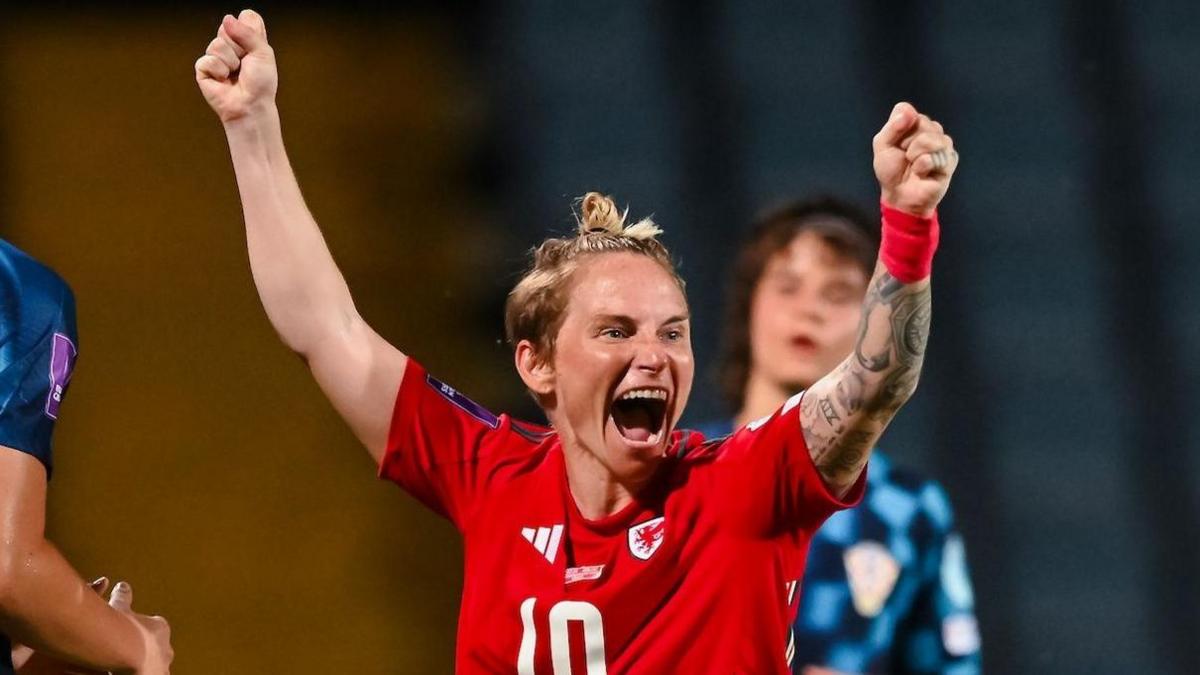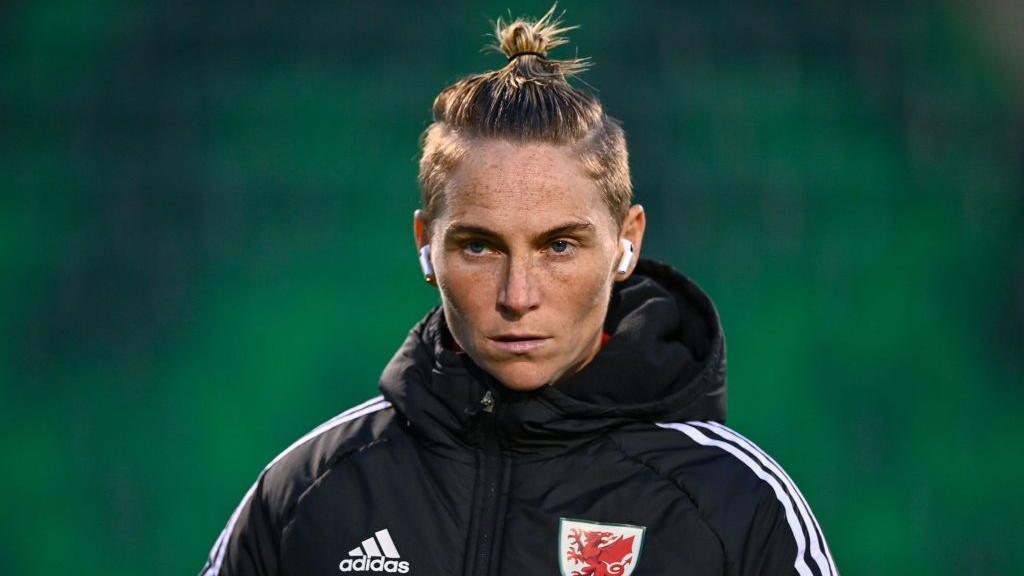Who is football's record-breaker Jess Fishlock?

Jess Fishlock is now the lead scorer with a record breaking 45th goal for Wales
- Published
She's been called a footballing "icon" by Wales boss Rhian Wilkinson.
She also has an impressive 154 caps and 45 international goals to her name.
And this week Jess Fishlock made history by breaking Wales’ all-time goal scoring record during her team's 2-0 win over Kosovo during the Euro 2025 qualifier at Llanelli's Parc y Scarlets.
As she accepts an Honorary Fellowship from Aberystwyth University on Thursday, we look back at where that glittering career on the pitch began.
'Class' to break Wales scoring record - Fishlock
- Attribution
- Published16 July 2024
'Class' to break Wales scoring record - Fishlock
- Attribution
- Published16 July 2024
Fishlock was born in Cardiff on 14 January 1987 and she said she enjoyed sports as a child.
But her love for football developed at a Mia Hamm soccer camp in Cardiff during the summer holidays.
"I played a lot of sports but football was my one true love," she told The Women's Game podcast.
"My older sister wanted to go to the camp and my mum said for me to go along with her.
"I just loved it and my mum says from that moment I was like, 'I'm not doing anything else, this is what I want to do."
At the age of seven she started training with Cardiff City Ladies FC before playing for the team at 15.
A year later she left school and got a job to support her football training, but she longed to go to US.
"At that time anything you saw from women's football was from America, there wasn't a girl's soccer camp for anyone in Britain back then," she added.
Around the same period she got her first cap against Switzerland.
Jess Fishlock: Watch her best Wales goals
At 19, while playing for Wales, Fishlock was approached to move to Holland to play for the professional women's team AZ Alkmaar.
Speaking on the Game Changers podcast, external she said it was difficult leaving her family, but ultimately they were supportive of her decision.
"I didn't know if I was emotionally or mentally capable of moving away by myself," she said.
When the Women's Super League launched in 2011, she returned back to the UK and joined Bristol.
In the same year she was named the FAW's Women's Player of the Year
In 2012 she moved to Australia and joined Melbourne Victory for a short while before making her move to the US.

Jess Fishlock played a key role in Wales' win against Kosovo
Fishlock joined the NWSL side of Seattle Reign FC where she said it was hard adjusting from the Women's Super League to the National Women's Soccer League.
"The levels were higher there just because of the sheer intensity, physicality and mentality - it was like night and day really," she said.
In August 2013 she joined Glasgow City FC on loan until November 2013 and briefly returned to Melbourne Victory on loan from Seattle Reign.
She spent the 2014-2015 off-season in Germany on loan from Seattle in the Frauen-Bundesliga with FFC Frankfurt.
In 2018 she received an MBE for services to women's football and the LGBT community.

Fishlock before February's international women's friendly between Republic of Ireland and Wales in Dublin
In 2019, she celebrated helping Lyon win the French women's league.
In April this year she was became the first Welsh player to reach 150 caps.
Earlier this month she said she will look back at the end of her career with immense pride at breaking Wales' goalscoring record.
While playing against Kosovo on Tuesday she scored her 45th goal for Wales, which saw her move ahead of Helen Ward in the nation's all-time leading scorer standings.
But when Wales' national team posted on X a graphic of her alongside other high scorers such as Gareth Bale and Ian Rush it attracted criticism - to which she responded.
"To everyone in my comments, going out of their way to say a graphic of my achievements is disrespectful to male players.
"Not a single person is comparing our careers, except you.
"We are one nation, playing one sport."
'We have duty to get rid of stigmas' - Jess Fishlock
Fishlock has spoken openly about her sexuality saying her experiences growing up have made her determined to be a role model in the LGBT community, especially for children.
She said that "high school for me was hell on earth" and "they are huge assumptions made about women who play football.
"For me if you play football and you're a woman, 90% of people automatically straight away think you're a lesbian," she said.
"Kids shouldn't lock themselves in their room or try and hide away from their family and be alone," she previously told the BBC.